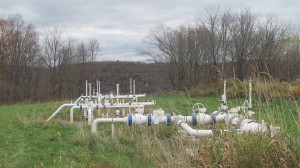Feds look toward regulating local gas gathering lines
-
Marie Cusick
A former federal pipeline safety administrator tells the Pittsburgh Tribune Review better regulations are needed to oversee the 230,000 miles of pipelines that gather natural gas from wells across the country.
These smaller lines connected to (often rural) production areas have less oversight than larger interstate transmission lines that carry gas to different markets, or distribution lines, which take gas directly into homes and businesses.
Brigham McCown, who was the first head of the U.S. Department of Transportation’s Pipeline and Hazardous Materials Safety Administration (PHMSA) says the rise in higher-pressure gas extraction from hydraulic fracturing means the rules should change.
From the Pittsburgh Tribune Review:
Federal regulations for gathering lines don’t take effect unless there are at least 10 homes along a mile of pipeline, regardless of the pipeline’s size.
“The way the rules are written, gathering lines — especially in rural areas — pretty much are not regulated,” McCown said. “They can pack a lot of punch.”
The pipeline safety administration began studying whether to regulate those lines in 2011 and likely will propose rules for them sometime this year. Pennsylvania ties its regulations to federal law.
U.S. Rep. Mike Doyle, D-Forest Hills, a member of the House Energy and Commerce Committee, said he supports extending regulations to cover larger gathering lines.
“We don’t use regulation that was designed back in the rotary phone era for smartphones today,” Doyle told the Trib in an interview Friday. “And obviously, with the advent of Marcellus shale, these pipelines are a lot bigger and carrying a lot higher pressure than what the regulations were designed for.”

















